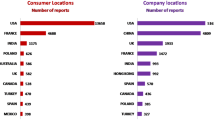Abstract
In India, as a result of the enactment and implementation of the Consumer Protection Act, 1986 there has been an increased amount of self-regulation by the public as well as by the private corporate sector. The mounting pressure by consumer organisations and the growing number of cases filed by consumers before the three-tier quasi-judicial Consumer Disputes Redressal Agencies established under the 1986 Act have propelled the corporate sector in India to become more socially accountable then ever before. Though it may be too early to comment on the success or failure of this Act, it has nevertheless initiated a process of change at least in the behaviour of the urban business community and has coerced it to regulate itself.
The paper purports to highlight and evaluate the present state of business self-regulation in India. The author has critically examined the “Codes of Ethics” recently announced by some sections of the business community in India. He has also endeavoured to cite a few recent cases argued before the Consumer Forums, more particularly by the consumers' associations, where instead of resorting to protracted legal battles, industry has reconciled itself to consumers' demands. Thus the central theme of the paper is to show how the 1986 Act has propelled the corporate sector to resort to self-regulation and to critically examine this new development. The author concludingly argues that in order to achieve the much-cherished goal of social change in India, much still remains to be accomplished and that there is a need for a co-ordinated approach to solve the problem of consumer protection as law alone may not be effective.
Zusammenfassung
Anbieter-Selbstregulierung und Verbraucherschutz in Indien: Eine Kritik. In Indien hat es als Folge der Einführung des Verbraucherschutzgesetzes 1986 ein starkes Anwachsen der Selbstregulierung gegeben, und zwar sowohl bei den öffentlichen Anbietern wie auch bei den privaten Anbietern. Es gab einen wachsenden Druck auf die anbietende Wirtschaft durch die Verbraucherorganisationen und durch die Tatsache, da\ die Konsumenten eine wachsende Zahl von Verfahren bei den dreistufigen quasigerichtlichen Verbraucherschiedsstellen eröffnet haben, die aufgrund des Gesetzes von 1986 eingerichtet worden sind. Jedenfalls hat dieser Druck ein deutliches Anwachsen der sozialen Verantwortlichkeit bei der indischen Wirtschaft bewirkt. Obwohl ein abschlie\endes Urteil über den Erfolg oder Mi\erfolg dieses Gesetzes noch nicht möglich ist, lä\t sich aber jetzt schon feststellen, da\ es einen Wandel zumindest im Verhalten der städtischen Anbieter bewirkt hat und zu mehr Selbstegulierung geführt hat.
Der Autor setzt sich kritisch mit den ethischen Verhaltensrichtlinien auseinander, die einzelne Branchen angekündight haben. Er führt au\erdem einige neuere Fälle an, die vor den Verbraucherforen verhandelt wurden, wo die beklagten Unternehmen den Verbraucheransprüchen entgegenkamen statt in langwierige gerichtliche Verfahren zu flüchten. Für das wichtige Ziel eines sozialen Wandels in Indien bleibt nach Meinung des Autors allerdings noch mehr zu tun; auf jeden Fall ist das Problem des Konsumentenschutzes allein auf gesetzgeberischem Wege nicht zu lösen.
Similar content being viewed by others
References
Antony, M. J. (1990).Consumer rights. Delhi: Clarion Books.
Bajaj, R. K. (1990). Preface. In:Consumer awareness: Initiatives from government, industry & consumer organisations. New Delhi: Associated Chambers of Commerce and Industry.
Bajaj, R. K. (1992). Protecting consumer interests — 25 years of business efforts. In:CFBP Silver Jubilee Souvenir (1966–91), pp. 13–14. Bombay: Council for Fair Business Practices.
Bajaj, R. K. (1987). Two decades of business efforts. In:CFBP Silver Jubilee Souvenir (1966–86), pp. 6–9. Bombay: Council for Fair Business Practices.
Bimal, S., Banerjee, R. and Mahurkar, U. et al. (1992). The fight back.India Today, August 15, pp. 46–47.
Cranston, R. (1984).Consumers and the law. London: Weidenfeld and Nicholson.
Deshpande, V. S. (1990).Keynote address to the All India Seminar on Consumer Protection. Seminar held at Panjab University, Chandigarh (India), March 24–25.
Is your advertising losing credibility: The threat and the solution (1985). Bombay: Advertising Standard Council of India.
Nayak, R. K. (1991).Consumer protection law in India: An eco-legal treatise. Delhi: Indian Law Institute.
Padmanabhan, B. S. (1991). Partial progress: Interview with V. Balakrishna Eradi.Frontline, 8(24), 84–85.
Rebello, A. (1991).Societal response to consumer movement: Business. Ahmedabad: Consumer Education and Research Centre. Consumer Education Series.
Recommendations of the workshops held by the CFBP (1985). Bombay: Council for Fair Business Practices.
Role of fair business practices and self-regulation in the new national ethos (1988). Bombay: Council for Fair Business Practices.
Saraf, D. N. (1990).Law of consumer protection in India. Bombay: N. M. Tripathi.
Singh, Gurbax (1990).Law of consumer protection. Jaipur: Bharat Law Publications.
Singh, Gurjeet (1992a).Consumer education in India: A viewpoint. Paper contributed to the XLV All India Commerce Conference of Indian Commerce Association, held at University of Bangalore, India, May 29–31.
Singh, Gurjeet (1992b).Consumer Protection Act, 1986 and self-regulation of business: The Indian scenario. Paper presented at the Socio-Legal Studies Association (SLSA) Annual Conference (April 13–15) held at University of Keele, Staffordshire, UK.
Author information
Authors and Affiliations
Additional information
Presently he is on Nehru-Centenary British Commonwealth Fellowship Award (1990–93) and is doing research at the Department of Law, School of Oriental and African Studies, Thornhaugh Street, Russell Square, London WC1H 0XG.
The author is thankful to the Post-Graduate Tutor and his learned supervisor Dr. Werner F. Menski for his valuable comments on the earlier draft of his paper.
Rights and permissions
About this article
Cite this article
Singh, G. Business self-regulation and consumer protection in India: A critique. J Consum Policy 16, 1–33 (1993). https://doi.org/10.1007/BF01024588
Issue Date:
DOI: https://doi.org/10.1007/BF01024588




